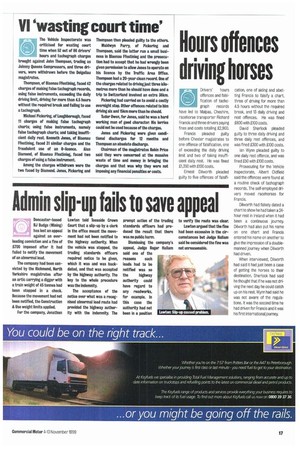Admin slip-up fails to save appeal
Page 19

If you've noticed an error in this article please click here to report it so we can fix it.
Doncaster-based RJ Budge (Mining) has lost an appeal against an overloading conviction and a fine of £700 imposed after it had failed to notify the movement of an abnormal load, The company had been convicted by the Richmond, North Yorkshire magistrates after an artic carrying a digger with a train weight of 45 tonnes had been stopped in a check. Because the movement had not been notified, the Construction & Use weight limits applied.
For the company, Jonathan Lawton told Teesside Crown Court that a slip-up by a clerk in the office meant the movement had not been notified to the highway authority. When the vehicle was stopped, the trading standards officers required notice to be given, which it was and was backdated, and that was accepted by the highway authority, The key to the whole procedure was the indemnity.
The acceptance of the notice over what was a recognised abnormal load route had provided the highway authority with the indemnity. The prompt action of the trading standards officers had produced the result that there was no public harm.
Dismissing the company's appeal, Judge Roger Hallam said one of the reasons such loads had to be notified was so the highway authority could have regard to any roadworks, for example. In this case the authority had not been in a position to verify the route was clear.
Lawton argued that the fine had been excessive in the circumstances but Judge Hallam said he considered the fine was not unreasonable.








































































































































